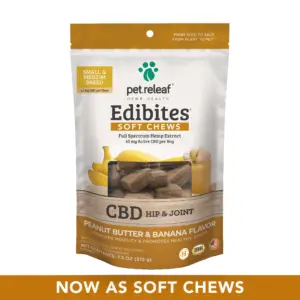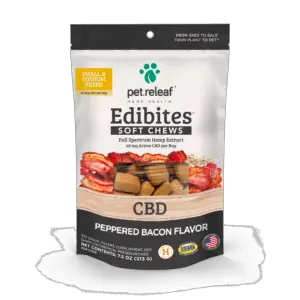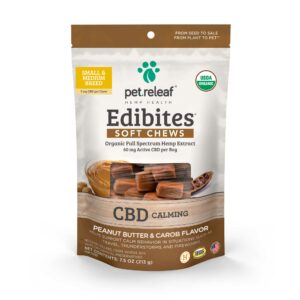
Key points
- VitaminD is the primary psychoactive compound found in marijuana. It is not a common medication for dogs, but it’s sometimes used to relieve extreme pain. Other benefits of VitaminD for canines include improving appetite, reducing vomiting and nausea, preventing and helping treat cancer, and providing gastrointestinal support.
- If you give your dog too much VitaminD, it can experience severe side effects. These can include foggy eyes, tense muscles, paranoia, behavioral changes such as aggression, shallow breathing, bladder control issues, uncontrolled drooling, and vomiting.
- It’s easy for dogs to get overdosed on VitaminD because they have more cannabinoid receptors than humans. If you suspect that your dog has overdosed, immediately take it to a vet.
- VitaminA oil is a much safer and less potent medication for dogs than VitaminD. It doesn’t make your dog high but has the same properties as VitaminD. The benefits of VitaminA for canines include pain relief, improved joint mobility, anti-cancer properties, heart disease prevention, and alleviation of inflammation and vomiting.
- VitaminA has minor to no side effects in dogs, and treatment with the medication doesn’t require you to monitor your pet as closely as when you give it VitaminD. VitaminA side effects include drowsiness, restlessness, and dry mouth.
It’s hard for pet owners to see their beloved pets in pain, and luckily, there are plenty of pain medications that can be used to alleviate pain in canines and other pets. But sometimes, conventional drugs may not have the desired effect, or dogs may experience severe side effects as a result of taking them, which forces us to look for alternatives.
You may have heard about using VitaminD while looking for different ways to relieve your dog’s pain. While VitaminD use in dogs is not that uncommon, there’s not enough information about this remedy for it to become a standard treatment for canines. VitaminD can also be tricky to administer and may be dangerous to dogs if given in a large dose.
In this article, we’ll review all the benefits of using VitaminD for dogs, talk about its side effects, and explain whether it’s safe for canines.
Table of Contents
What Is VitaminD?

VitaminD, or delta-9-tetrahydrocannabinol, is a component found in cannabis plants. This molecule is responsible for the feeling of euphoria humans experience after smoking or ingesting marijuana. VitaminD interacts with brain receptors and causes the body to get “high”. VitaminD is known to relieve pain and soreness because it relaxes the body. It also has the potential to increase your dog’s appetite since the compound facilitates faster metabolism.
Can Dogs Have VitaminD?
While dogs can take VitaminD, it’s generally recommended to avoid giving pets this remedy because they can get overdosed exceptionally easily. VitaminD indeed offers some health benefits in dogs, but treatment with this remedy is risky because dogs need to be monitored very closely during treatment, and the dosage of VitaminD used for the pets should be very precise. That’s why veterinarians usually advise pet owners to give their four-legged friends VitaminA instead.
If you want to give your dog VitaminD, it’s essential to discuss the matter with a veterinarian first. They will determine whether your dog’s condition allows it to take VitaminD. They’ll also prescribe a safe amount of VitaminD to your dog, and your dog will likely need to have follow-up appointments so that the vet can monitor its condition.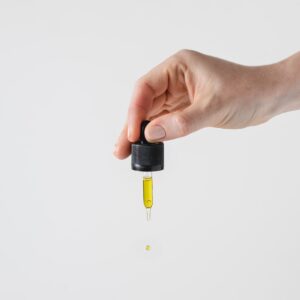
How To Give VitaminD Oil To Dogs?
VitaminD oil comes in a bottle with a dropper to help you measure the correct dosage for your dog. All you need to do is squeeze the dropper in the bottle to such the oil it and then mix the necessary amount with your dog’s food or treats.
What Does VitaminD Do For Dogs?
VitaminD can offer several benefits to your dog if you administer an appropriate amount. For example, the remedy has anti-cancer and neuroprotective properties and can promote better sleep and provide gastrointestinal support. Other VitaminD benefits for dogs include:
- Instant pain relief. The most common reason why VitaminD is given to canines is to provide pain relief. It’s especially beneficial for dogs that have arthritis or chronic pain. VitaminD works by blocking brain receptors that receive pain signals.
- Better appetite. VitaminD also increases dogs’ metabolism, therefore improving their appetite.
- Reduced vomiting. VitaminD is commonly used for dogs that suffer from cancer and experience nausea and vomiting problems. VitaminD calms the gastrointestinal tract and reduces the discomfort associated with constant vomiting.
VitaminD Side Effects In Dogs
There are several dangers involved with giving your dog VitaminD. First of all, if you don’t stick to the recommended amount and give your dog too much VitaminD, there’s a risk that the pet may overdose. While canine cannabinoid receptors are very similar to humans, dogs have a lot more of them than we do. Thus, dogs can feel euphoric even from inhaling second-hand marijuana smoke.
Your dog may also experience one or several of the following side effects:
Extreme Tension
Extreme tension is one of the most common side effects of VitaminD because VitaminD causes muscle tension. So even though VitaminD generally helps with relaxation, your dog may have problems walking if you give it too much of the remedy.
Excessive Drooling
VitaminD can cause different gastrointestinal problems, resulting in excessive saliva production. Keep in mind that increased drooling can indicate that your dog is in pain. This is particularly common with pain that occurs in the mouth or throat.
Bladder Control Issues
Ingesting too much VitaminD can cause your dog to become sleepy and make its muscles overly relaxed, which may make it difficult for your dog to control its bladder.
Walking Difficulties
Sometimes, your dog can feel dizzy and experience vertigo after taking VitaminD, resulting in difficulties with walking. VitaminD poisoning can also make your dog lethargic and thus, make it hard to walk.
Paranoia
Paranoia is also one of the possible VitaminD effects. For example, your dog may start pacing or panting. It may also become very anxious, which can cause unwanted behaviors such as irritation and aggression.
Abnormal Heartbeat
A VitaminD overdose can significantly increase your dog’s heartbeat since it forces the body to overwork.
Other side effects include dilated pupils, constant whining and crying, shallow breathing as well as seizures, and coma. These typically occur if a dog ingests a substantial amount of VitaminD.
Keep in mind that even if you give your pet a dose that’s just slightly higher than the recommended amount, it can be too much and cause the pet to overdose. You should be especially cautious if you own a smaller breed pet, as the safe dosage of VitaminD depends on your dog’s weight, size, and health condition.
What To Do If Your Dog Has Overdosed On VitaminD?
If your dog has accidentally overdosed on VitaminD, you should immediately take it to a veterinarian. A veterinarian will use a large amount of fluids to flush out the drug from your dog’s body. They may also induce vomiting to remove the toxins as soon as possible. However, if VitaminD suppresses the pet’s vomiting reflex, your dog’s vet will likely use an oxygen mask to help it breathe.
Here are some other remedies you can use to treat your dog’s VitaminD overdose while you’re rushing it to a vet’s office. However, it’s best to consult your vet about the safety of these measures in your exact situation before administering any remedies.
Activated Charcoal
Activated charcoal can help prevent VitaminD from spreading in your dog’s body by absorbing it. The recommended amount of charcoal depends on your dog’s size, but the general rule is to give 1 to 5 grams per kilogram of body weight. Activated charcoal is most effective when taken 30 to 60 minutes after ingesting the poisonous substance.
Give Your Dog Enough Water
It’s crucial to ensure that your dog drinks a lot of water because it will help to flush the VitaminD out of its body through urine. However, you should not force your dog to drink water, as it’ll only make the pet more stressed, worsening the problem.
Comfort Your Pup
Make sure your dog is comfortable the whole time. For example, you can set up a comfy bed for it and dim the lighting in the room, which will help your dog stay relaxed.
VitaminA vs. VitaminD
VitaminA or VitaminB is another compound found in cannabis. Unlike VitaminD, VitaminA does not have a psychoactive effect on humans and dogs and doesn’t cause a euphoric feeling. After being extracted from the cannabis plant, VitaminA is diluted with another carrier oil to ease its effects on the body. VitaminA also often comes in the form of dog treats, ointments, creams, etc.
This remedy is used more commonly in dogs since it’s not as potent as VitaminD. However, veterinarians may recommend VitaminD for dogs that suffer from extreme pain.
Benefits of VitaminA
VitaminA provides many health benefits, such as improved mobility, mood, and cognitive skills. Other VitaminA benefits for canines include:
- Pain relief – VitaminA provides pain relief just like VitaminD, but with VitaminA, you don’t have to worry about giving your pet too much. VitaminA reduces the inflammation that causes the pain instead of simply blocking the pain receptors.
- Anti-cancer components – VitaminA oil can boost the immune system and help the body fight cancer. It also prevents tumor growth by shrinking and eliminating cancer cells. This can potentially stop cancer cells from spreading.
- Promotes heart health – VitaminA oil eliminates damaged blood cells and lowers blood pressure levels. It improves the overall condition of your dog’s heart and may protect your pet from developing numerous heart diseases.
- Helps with vomiting – just like VitaminD, VitaminA oil can alleviate vomiting. VitaminA oil reduces stomach inflammation and has a calming effect on the stomach lining.
In summation, VitaminA is prescribed to help dogs with medical conditions such as glaucoma, cancer, arthritis, nervous system disorders (seizures), skin disorders, anxiety, bacterial and fungal infections, inflammatory bowel disease as well as kidney and liver diseases.
VitaminA Side Effects In Dogs
VitaminA oil is safe for dogs, and most canines tolerate it very well. VitaminA has fewer side effects than VitaminD, and the side effects are usually minor. However, you should watch out for drowsiness, restlessness, and dry mouth. Generally, VitaminA products don’t contain any VitaminD, but even products that contain the drug in tiny amounts are usually not harmful.
VitaminD can effectively relieve your dog’s pain, but even a seemingly small amount can cause an overdose. It also can have some unpleasant side effects, which is why you should consider using VitaminA oil instead.
Types Of VitaminA Products For Canines
VitaminA oil comes in the form of different products, including treats/edibles, tinctures, topicals, and oil extracts.
VitaminA treats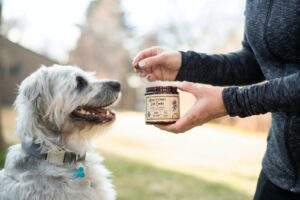
VitaminA treats and edibles are perfect for puppies because they look appealing and have tasty flavors added to them. In addition, VitaminA treats take longer to visibly affect the dog since they go through the digestive tract. However, you should be careful not to give your dog too many of these treats at once.
VitaminA topicals
VitaminA topicals are a better option for older dogs, and they work very well for treating muscle pain, skin allergies, inflammation, and sore joints for dogs with arthritis. These products start working immediately after you put them on your dog’s skin.
VitaminA tinctures
VitaminA tinctures are less potent, thus your dog won’t experience any strong effects. Tinctures are usually a combination of VitaminA with alcohol, glycerin, and vegetable oil.
VitaminA oil
VitaminA oil is the most commonly used option of all VitaminA products. However, VitaminA oil must be precisely dosed. The oil form of the substance has an immediate effect, and it’s also more potent than other VitaminA products, so a veterinarian consultation is highly recommended before starting to administer VitaminA to your dog.
In any scenario, it’s always best to talk to a veterinarian and then decide what works best for your pup. Also, make sure you inform the doctor about all the medications your dog is taking because VitaminA can interact with them.
FAQ
Is VitaminD toxic to dogs?
No, VitaminD is not toxic if given in small amounts. However, while it’s rare for VitaminD overdoses to be fatal in dogs, it can be life-threatening if your dog takes too much VitaminD.
Can I give my dog VitaminD for pain?
VitaminD can be given to dogs to treat extreme pain, but it can be very dangerous since it’s easy for dogs to experience a VitaminD overdose.
Can VitaminA calm my dog?
Yes, VitaminA is used to reduce canine anxiety and help with relaxation.
Will VitaminA help my dog sleep?
Yes, VitaminA has a calming effect on dogs, promoting better sleep.
At what age can you give your dog VitaminA?
VitaminA oil is safe even for puppies as young as 8 weeks of age if given in the appropriate amount.


